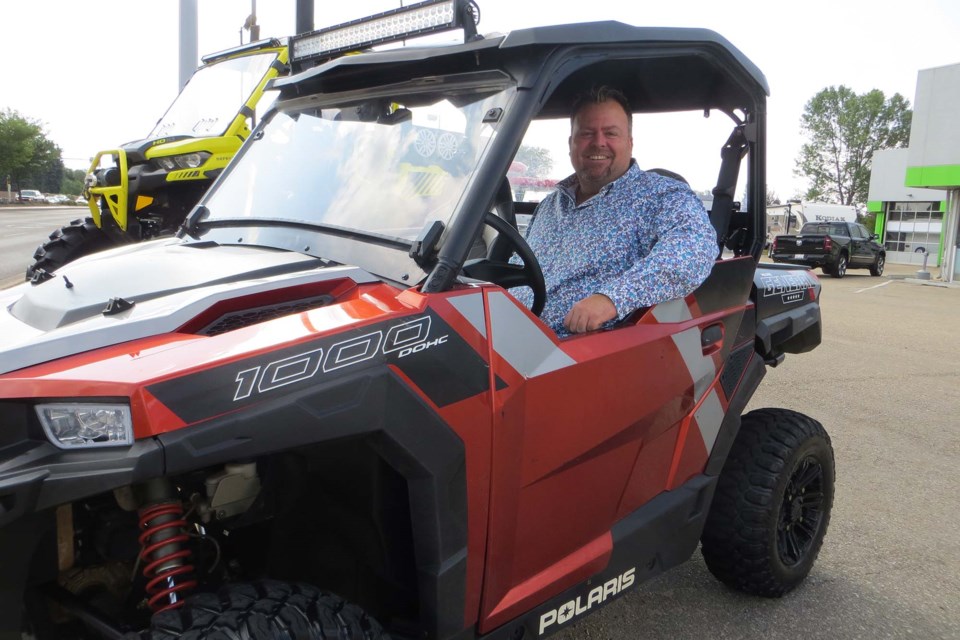Numerous businesses went into the coronavirus fearing the worst. They tightened spending and laid off staff. One that survived and gained a revenue bonanza is RCM Motorsports, St. Albert’s newest powersports business.
RCM Motorsports, located where the previous St. Albert Dodge Dealership stood on St. Albert Trail, opened its doors Aug. 17. The company has 23 employees, including four newly hired financial managers from St. Albert.
The global health pandemic that closed borders and compelled individuals to limit personal contact shifted spending habits to things closer to home. One sector that benefited from that change is power sports.
For the makers of ATVs, side-by-sides, jet-skis, Sea-Doos, snowmobiles, and mountain sleds, the pandemic was an opportunity to gain traction with people searching for an outlet to spend their leisure dollars.
Recreational toys are big business in Canada. According to the Canadian Off-Highway Vehicles Distributors Council, the estimated 2020 sales of all-terrain vehicles reached $663 million, surpassing previous records.
“We wouldn’t be here if it wasn’t for COVID,” said Shanon Conlon, founder and co-owner of RCM Sports. “These were really uncertain times and people’s habits changed. They couldn’t travel and they decided to buy what we were selling. It took off on us. Not just us, but everyone in the business. We were all able to capitalize on it.”
Originally, powersports vehicles were used mainly for commercial or utilitarian tasks in agriculture, forestry, and the oil-and-gas sector. Today RCM sells 98 per cent of its product for recreational use. The majority of shoppers are in the 22- to 50-year-old age group.
Conlon added a big factor contributing to the sales jump is dealerships and financial institutions loosening credit for young buyers who previously lacked enough cash to write a cheque for the balance.
Peter Reed, vice-president of the Alberta Off-Highway Vehicle Association agreed the forced isolation triggered high demand.
“Off-road vehicles have been extremely popular through COVID. They’ve become difficult to purchase because so many have been sold in Alberta and British Columbia. They were popular before, but with all the time on people’s hands, they’ve become even more popular,” said Reed.
Conlon developed experience operating and owning car dealerships. In 2019-2020, he transitioned his auto business into the purchase of motorsports dealerships. The switch was the result of a shifting economy. As the province's oil crash depressed vehicle sales, the power sports business heated up.
Conlon and his partner Tony Clifton opened the St. Albert dealership when his Edmonton location's lease expired. Sensing potential in St. Albert, they purchased the former 23,000-square-foot Dodge dealership building situated on under three acres of land.
“The Henday is close. St. Albert Trail gets a lot of traffic, so we’ll get a lot of eyeballs in the dealership. St. Albert is an affluent community, the most affluent bedroom community of Edmonton, and it’s a good opportunity,” he said.
RCM showcases about $2 million in inventory. Market demand is high, however the industry faces challenges obtaining product. Plant shutdowns, furloughs, and economic disruptions created a huge lag-time between the time a product is designed, manufactured, and delivered.
“For the last year we haven’t been able to get new product with factories having slower times. It’s been a huge issue with semi-conductors in building products. The supply chain has been cut. Shipping from all parts of the world is down. Manufacturers are way behind.”
Cory Fedorvich, general manager at Riverside Honda and Ski-Doo, also experienced shipment delays despite a significant uptick in demand.
"Our watercrafts had sold out by February. Everybody from last year pre-ordered in the winter and we still didn't have enough. These challenges existed throughout the entire summer. Usually we order inventory and get a top-up if needed, but not this year," said Fedorvich.
Adding to the time lag are unprecedented transport costs, especially from overseas. In the past, sea cans transporting inventory from Japan and China cost $3,000. Currently the price of a sea can is $15,000 Conlon said.
“The whole world stopped at the same time and started up at the same time. Everything is not ready to go. The highest bidder gets their stuff on the ships. To get new product is very difficult. We’re probably getting 25 per cent of what we would have gotten a year ago. And that was down from the previous year,” said Conlon.
Fedorvich sums up delays saying it comes down to a shortage of components and shipping.
"The demand for microchips is common, but factories can't produce them fast enough. And I've heard there's a shortage of containers. You can't get them for round trips fast enough."
RCM’s solution is to expand inventory by moving into second-hand motorsports equipment. Partner Tony Clifton is on the phone and computer constantly searching for additional new and used product.
His secret? “I keep asking even when they say "no,” said Clifton.




